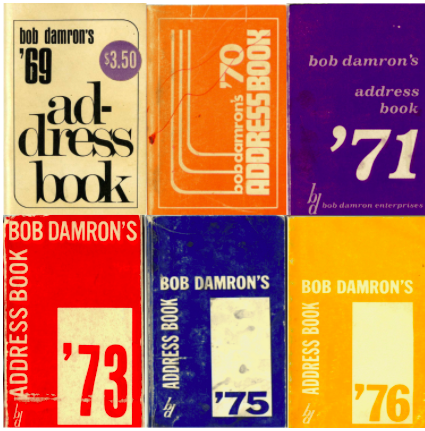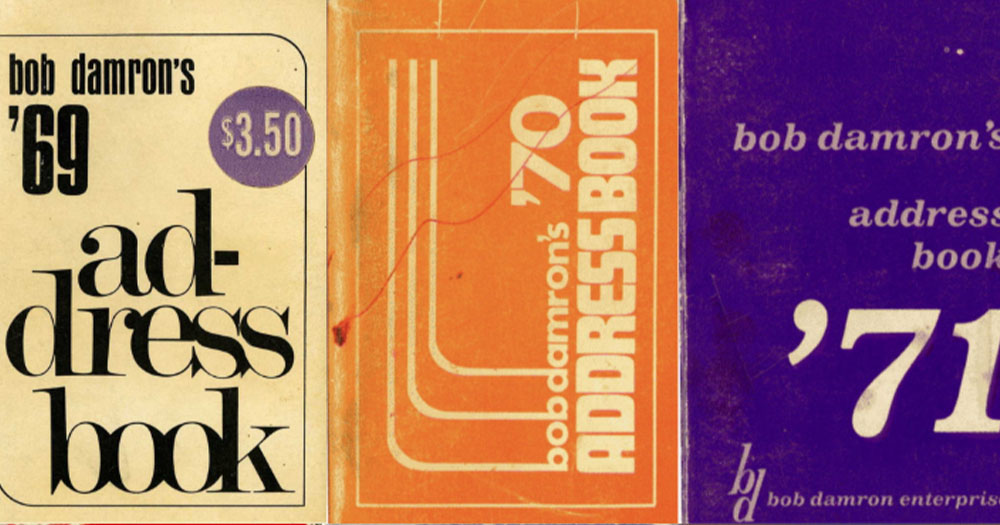In another time and place, traveling businessman, Bob Damron, created an unusual address book. As a gay man from San Francisco, he kept track of his travels to other parts of the US between 1965 and 1980. And thanks to a pair of historians, these gay ‘travel guides’ are going online.
Today it is a digital map preserving yesterday’s queer enclaves and LGBTQ+ sanctuaries. Back then, however, what has been referred to as the ‘gay Green Book‘ was more of an underground rainbow GPS.
Long out of print, Damron’s handwritten address books endure in digital format at Mapping the Gay Guides. Thanks to professors Amanda Regan and Eric Gonzaba, MGG recently received a three-year grant that will allow it to expand. By creating data from the travel guides covering 1981 to 2000, the guides pinpoint exactly how queer spaces evolved in the US during the AIDS crisis. MGG also contains a number of wistful vignettes well worth reading. If you like old photos, this section is for you, antiquarian artifacts and all.
Dr Gonzaba’s research suggests that the Damron guides were definitely geared toward travelers, but plenty of folks used them to keep track of gay life in their own cities too. MGG does embrace the idea of tracking gayborhoods, and Gonzaba’s research team is already doing this in some ways.
By looking at the guides from a macro level, they hope to confirm both the existence of gayborhoods and other spaces that should be (or were deemed) gay villages in their respective periods. Dr Gonzaba is so passionate about the gay past, he also maintains a digital archive of historical queer t-shirts.

Similarity has been drawn between Damron’s travel guides and the Victor Hugo Green published Negro Motorist Green Book in 1936. A civic leader and postal employee, Green intended his guidebook for fellow African Americans. In order to travel safely, they needed a literal road map to avert disaster. Green knew how dangerous navigating racial segregation was during the Jim Crow Era.
He wrote optimistically in the first edition of his book, “There will be a day some time in the near future when this guide will not have to be published. That is when we as a race will have equal rights and privileges in the United States.” After passage of 1964’s Civil Rights Act, the guide’s raison d’etre did wane. And though Green died four years before this, the 2018 movie Green Book introduced his legacy to a new generation.
This Academy Award winning film features the story of Dr. Don Shirley, a great classical and jazz pianist and composer. Despite speculation about Dr Shirley’s sexuality, even if he were gay, he probably would not have sought out The Address Book by Bob Damron. That’s because Damron “didn’t empathize with people of color or women,” according to Gina Gatta, the company’s lesbian owner.
My colleague @adamgolub let me know that gay travel guides are part of the storyline in a season 3 episode of Dawson’s Creek in 1998. Fascinating how these guides (like those used in the Mapping the @GayGuides project) found their way into 1990s pop culture. #twitterstorians pic.twitter.com/epH7ROBMJS
— Eric Gonzaba (@EGonzaba) May 22, 2021
What makes this memory lane so vital for posterity is how it presents society’s unvarnished past. Readers of queer culture will marvel at how seamlessly MGG connects one era to another. It does beg the question: what’s lost and what’s found when barriers wither away?
As MGG shows, many of Damron’s obstacles to safe travel disintegrated over time. And removing boundaries is one way to expand horizons.
© 2021 GCN (Gay Community News). All rights reserved.
Support GCN
GCN is a free, vital resource for Ireland’s LGBTQ+ community since 1988.
GCN is a trading name of National LGBT Federation CLG, a registered charity - Charity Number: 20034580.
GCN relies on the generous support of the community and allies to sustain the crucial work that we do. Producing GCN is costly, and, in an industry which has been hugely impacted by rising costs, we need your support to help sustain and grow this vital resource.
Supporting GCN for as little as €1.99 per month will help us continue our work as Ireland’s free, independent LGBTQ+ media.
